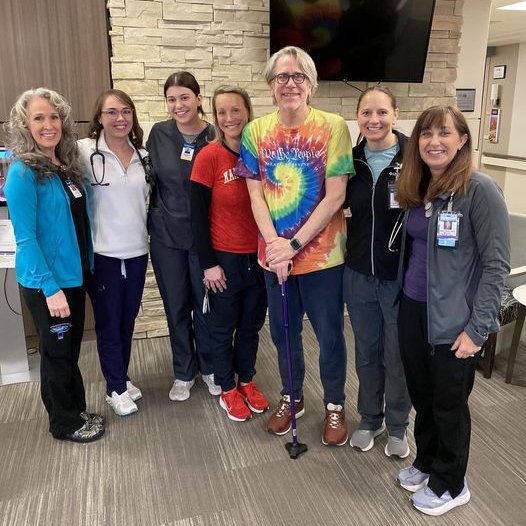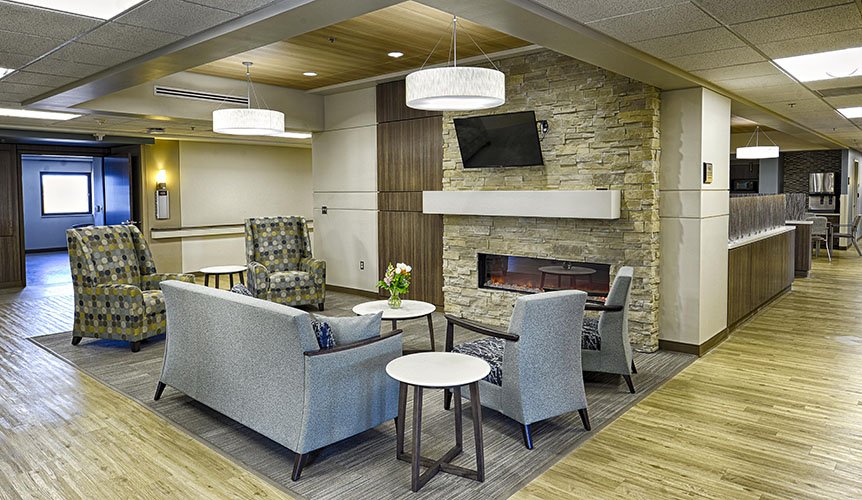Recovery is a team effort
Charles “Tony” Silvestri isn’t a stranger to working collaboratively. Working as a poet, lyricist and Washburn history professor has provided plenty of experience working with others, ranging from choral pieces to book publication. However, he never expected that his own health and recovery would be dependent on collaborating with a team of LMH therapists—Katie Renyer, Trena Triplett and Kari Koester. Around Thanksgiving 2023, Silvestri noticed something was off. He began to experience numbness in his fingers and toes which would later progress to his lips and tongue. Even after consulting with his primary care provider, they could not figure out the cause.

Tony Silvestri stands surrounded by his care team
“The initial tests did not reveal the cause of what was making parts of my body numb. In the meantime, I was getting more fatigued and to the point that I could not hold up my body,” said Silvestri.
Following the advice of his primary care provider, Silvestri’s parents and partner took him to the emergency room at the University of Kansas Health System where he would quickly be seen by a specialist. Upon his arrival, he was rushed to the intensive care unit, intubated, and diagnosed with the rare autoimmune disorder Guillain-Barre syndrome, which attacks the nervous system beginning at the outmost extremities before working its way inwards to the heart and lungs. It was there in the ICU that Silvestri began the fight for his life.
“I was completely paralyzed,” said Silvestri. “It had attacked all of my nerves and my diaphragm, which left me unable to breathe on my own. The entire time I was in the ICU, I kept thinking about when I would be able to get back to Lawrence. I saw how much extra stress my loved ones were under by having to drive to Kansas City every day.”
It turns out the universe was listening. Once he was stabilized, his loved ones and his care team determined that he would benefit from recovering at LMH Health on the acute rehab unit.
“My dad had previously stayed in acute rehab following a hip replacement,” said Silvestri. “They knew I wanted to be home at the nearest best rehab place.”
On December 10, Silvestri was transported back to Lawrence to begin his long road to recovery.
A collaborative effort
The transfer to LMH Health marked the second phase of Silvestri’s recovery. It would consist of regaining use of his muscles, re-learning to walk and write and most importantly, it would reveal what his new normal would look like. It was estimated that Silvestri would be in the acute rehab unit for at least a month.
“It was encouraging to be able to look out and see Lawrence and know that I was one step closer to home,” said Silvestri. “Plus this is my hospital and my community. It’s familiar and comforting to me.”
There were two major challenges that Silvestri wanted to overcome, and each would require a collaborative effort with Koester, Renyer and Triplett.
“The city of Lawrence is very lucky to have a local rehabilitation option that offers such high-quality collaborative care,” said Nami Stone, physical therapy director at LMH Health. “The physical therapy, occupational therapy and speech-language pathology teams work together to provide three hours of therapy five days per week, often working around full schedules and new admissions each day.”

The LMH Health acute rehab unit was renovated in 2016. The renovation included private rooms, open dining, a home-like family gathering area, a therapy gym and even an apartment to practice daily living skills.
Patients affected by stroke, hip fractures and other debilitating illnesses or injuries can find follow-up care after an acute inpatient hospitalization stay by being admitted to the hospital’s fourth floor, which includes 12 acute rehabilitation beds and 14 skilled nursing beds. Both the acute rehabilitation and transitional care unit programs offer services to help patients return to the highest level of independence possible, although the types and intensity of services vary based on condition and level of rehabilitation required.
Stone explained the ultimate goal for each patient is safe discharge home. To accomplish that, teams meet weekly, if not daily, to make sure their work maximizes the ability for each patient to progress appropriately toward that goal. Data about outcomes for each patient is collected and submitted, and demonstrates the care provided on the rehab unit meets and at times exceeds national averages.
Koester, an occupational therapist, worked closely with Silvestri to regain his independence in his activities of daily living. This included tasks such as getting dressed, completing personal hygiene tasks and improving the strength and use of his arms and hands.
“It was all about making adaptations every day in order for Tony to accomplish what he needed. As he improved, we were able to take some of those adaptations away,” said Koester. “We would set a daily achievable goal so he could see that he was making progress. It was frustrating for him to have lost so much, so it was really important for him to see his progression.”
Renyer, a physical therapist, was also working with Silvestri to strengthen his muscles and increase his tolerance for movement. She worked with him to be able to sit at the edge of his bed, stand and walk using parallel bars, walk without assistance and go up and down stairs.
“Tony knew from the beginning that I was going to push him to get stronger and regain his independence. I was not going to give up on him and I was not going to allow him to give up on himself,” said Renyer.
At the same time, Silvestri was working with Triplett, speech-language pathology, to improve his facial muscle sensation and movement, voice and swallowing. Following his hospitalization, Silvestri was fitted with a feeding tube. He was unable to swallow food and protect his airway, which could result in silent aspiration.
“The goals Tony wanted to achieve were to eat and sing again, and his overall goals were to return home and resume work,” said Triplett. “We focused on improving Tony’s ability to increase voice intensity, regain right-sided facial sensation, movement and symmetry and to swallow safely.”
Silvestri’s recovery was important to everyone working in the acute rehab unit. The entire team, including his physician, nurses, therapists, social worker, dietitian and pharmacists, consistently communicated concerns, recommendations, and jointly coordinated modifications in his care to promote the best environment to be successful. Weekly meetings guided planning for Silvestri to have ongoing community services and therapy upon discharge.
“My entire team would encourage me to try to do tasks I didn’t think I could do,” said Silvestri. “I would make a weekly goal on Monday, but then by the afternoon, I would have beaten it. I was walking, doing stairs and building muscles. There was something great about having a normal experience.”
By late January, Silvestri had his feeding tube removed, could stand up and walk unassisted, and go up and down four flights of stairs with relative ease. His team felt comfortable discharging him from the acute rehab unit.
“My advice is to trust your team and do what they say, that’s what allowed me to be discharged with confidence,” said Silvestri. “I let them drive the bus and did what they asked with cheer. I knew that everything the team at LMH Health worked on with me was to help me regain my independence.”
Silvestri’s recovery is not over, as he continues to work closely with LMH Health Therapy to maintain and retain his strength and mobility. Since his discharge, he has returned to playing music and will return to teaching in the fall. His next large milestone is to be cleared for driving.
“I am entering a new chapter of my story and restoring the parts of my old life I want back,” said Silvestri. “I wouldn’t be where I am today without the encouragement and support of everyone in acute rehab.”